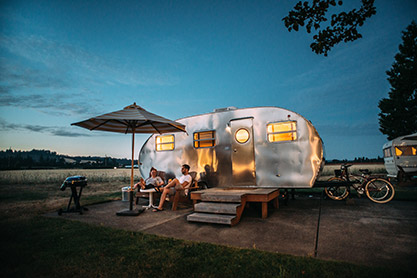
With the blossom appearing and the daffodils blooming, it can mean only one thing. Winter is over. It’s finally time to lead your caravan out of hibernation, warm her up and get her on the road for that long-awaited spring getaway. With that in mind, let’s not get too carried away and go roaming across the country without making the necessary checks.
Whether you are planning on towing your caravan to a series of stunning destinations, or driving your portable holiday home across the country, there are several steps that need to be taken to ensure that you are road trip ready.
Towing your caravan
When towing your caravan, the first thing to check would be that the breakaway cable (or safety chain) is connected correctly and is in good working condition. Along with this, it is a legal requirement for the caravan to be visible from the cars driver’s seat, so be sure to position your mirrors (or purchase extension mirrors if necessary) to ensure that you can see both the back end of the caravan, and the road behind you, at all times.
The tyres on both your car and your caravan should be inflated to the correct pressure, have no wear and tear and a tread no lower than 1.6mm.
You will also need to be cautious to not overload your caravan. A heavy caravan increases the risk of instability and swaying which will be hazardous on all road types. Heavy items should be placed correctly (on the ground and in the centre) within your caravan to ensure the safest drive. Another factor to play a part in the stability of your caravan are steep hills and slopes, they will creep up on you. Be sure to lengthen your stopping distance when going downhill.
If there are strong winds, it may be best to change your route or reconsider the journey all together. The force of other vehicles overtaking you on a dual carriage way or motorway will also affect the stability of your trailer if it is loaded incorrectly or being towed too fast.
Towing a caravan may be unfamiliar, but there is no need to make it a daunting scenario. In most cases, accidents only occur when drivers do not take the correct advice. A refresher of the highway code could benefit you if you are experiencing nerves.
Driving your caravan
Before tucking your caravan away for the winter months, it is likely that you took measures to protect some of its equipment, such as disconnecting the battery. Make sure you clean the leads and terminals before reconnecting the battery. Follow your instruction manual on how to check that it is reconnected correctly and charge it up for a few days prior to your trip if necessary.
The smaller checks, such as checking if the lock and alarm systems still work, will prove invaluable for your caravan. You can also check that your caravan is watertight by hosing it down and checking for water inside of the vehicle. Water damage can lead to damp and mould, as well as making your journey less enjoyable through those April showers.
Other leaks that you should look out for are those from within your water system. After filling up your water tanks and reconnecting the pipes, run the water through for a while and examine for any pools or drips of water. Once you have fixed any apparent breaks in the system, run the water through again to make sure you haven’t missed any areas that need attention. You are then able to fill the water tanks with sterilizer, flush them out fully and then refill with fresh and clean tasting water.
It is also vital to check that the tyres are in great condition. Bearing the weight of the caravan at all times, they need to be robust and fully inflated, with no bulges, cracks or wear on the tread.
Before taking your caravan onto the road, consider getting it checked by a professional, along with your car, to ensure you are ready to hit the road. If you would like to book your car or caravan in for a service, our team at Bromley Vehicle Test Centre will be happy to help. Give us a call on 020 8460 6666 to get booked in.
